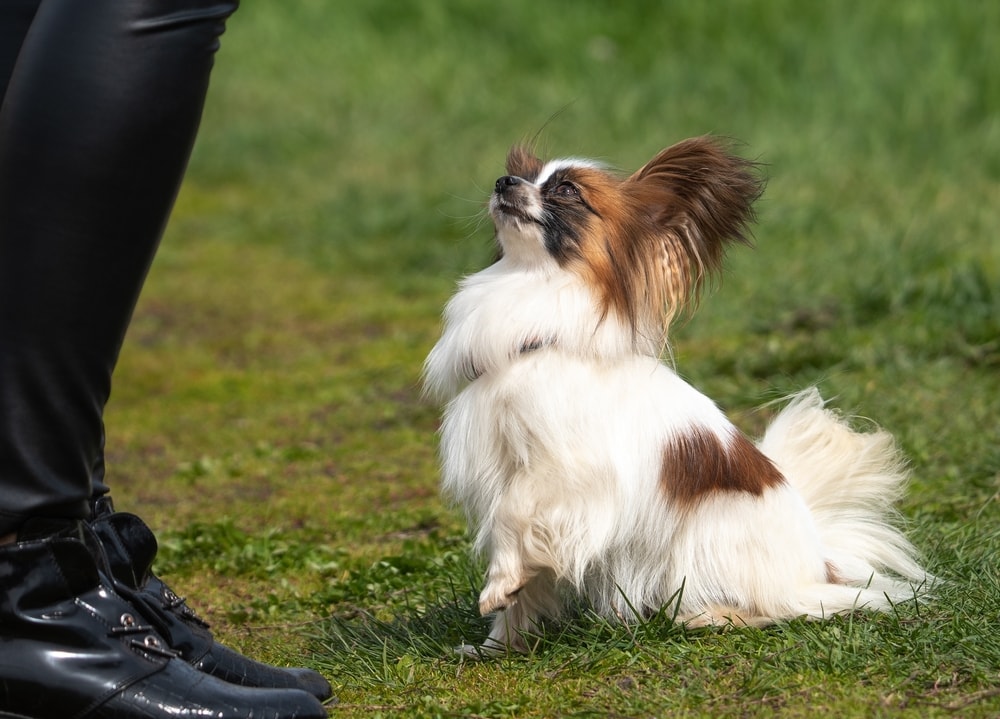
[ad_1]

Papillons are absolutely adorable. These small, fluffy dogs are often described as healthier than other toy breeds, which is true. They’re a great option for those who want a smaller dog but not the health problems that come with many of the toy breeds today.
However, that doesn’t mean these dogs are perfect. While they do have lots of benefits, there are also many cons you need to consider before adopting one. In this article, we’ll take a look at both the pros and cons of this breed, allowing you to decide if they’re the best dog breed for you.

The 6 Pros of Papillons
1. Small
Many people love Papillons because they are small. These dogs only weigh around 4 to 8 pounds, making them a solid choice for those who live in an apartment or smaller house. They’re also great for those who want a small dog to travel with, as they’re very portable and easy to carry around. You don’t have to do much pre-planning when transporting these dogs in the car, either.
They’re also wonderful for those who simply can’t handle a larger dog, like seniors.

2. Very Intelligent
Unlike many smaller dogs, Papillons are intelligent and very trainable. They can learn many tricks and commands, unlike many toy breeds. Plus, they’re eager to please their owner, allowing them to respond better in real-world situations.
Their intelligence also means they can get bored easily, though. You’ll need to provide them with tons of stimulating toys, training opportunities, and social interaction. Otherwise, they can become exceedingly bored and potentially even destructive.
3. Loyal and Affectionate
Papillons are very loyal and affectionate dogs. They love to be around their people and will follow them everywhere. They’re bred primarily to be companion animals, and they act like it. They’re very good at picking up on their owner’s emotions, making them wonderful companion animals.
Unlike other small breeds, they don’t tend to be one-person dogs. They bond equally with just about everyone in the household and tend to be friendly with strangers. They aren’t possessive when socialized and trained properly.
Their affection and loyalty are one reason they are so popular. They’re simply very rewarding dogs to own.

4. Good with Children
Papillons are generally good with children, but they should be supervised around young children who may not be gentle enough. They are incredibly small dogs, which means they can be injured easily by children who don’t know how to handle them.
Of course, it’s important to teach children how to interact with these dogs safely and respectfully. Even though they are very small, they aren’t toys and shouldn’t be treated as such.
5. Easy to Groom
Despite being very soft, these dogs are relatively easy to groom. They don’t require much brushing. Often, a few times a week is fine. Bathing can occur every few months as the dog gets dirty. Plus, they’re also relatively low-shedding, which makes them great for those who don’t want tons of dog fur around their home.
This low grooming need makes them relatively easy to take care of, especially when compared to other popular toy breeds.

6. Generally Healthy
One big reason these dogs are growing in popularity is because of their health. Many other toy breeds aren’t healthy at all, as they have been bred for appearance instead of health. Papillons have not suffered from the “cute dogs only” trend, as they were historically bred to be rather small. They aren’t prone to many health problems for this reason.
That said, they can still get a few health issues, particularly dental problems. It’s important to take them to the vet regularly and invest in regular dental cleanings if necessary.

The 5 Cons of Papillons
1. Yappy
Papillons can be exceedingly vocal, especially when left alone. They like to be with their humans and may have isolation anxiety when left alone. While they aren’t typically prone to separation anxiety (which is caused by being overly attached to a particular person), isolation anxiety can lead to excessive barking and even destruction.
That said, these dogs can make great alarms. They will bark to warn you when someone is outside that isn’t supposed to be. However, it’s important that they are trained not to bark all the time.

2. Attention-Seeking
While these dogs don’t require a lot of grooming, they do require tons of attention. They are very social dogs that require being around people a lot. They aren’t a breed that you can leave home alone for extended periods. If you work away from home for much of the day, you may want to consider looking elsewhere for a more suitable breed.
This attention-seeking behavior can be wonderful if you want a cuddly dog. However, it can also get annoying very quickly.
3. Moderate-Maintenance
On practically all fronts (grooming, exercise, etc.), these dogs are low-maintenance. However, when you add everything together, it can translate to a significant time investment each week. For instance, these dogs need to be brushed several times a week. They also need to be taken for daily walks. They may get easily bored or destructive under some circumstances, as well.

4. Fragile
Papillons are very small, which makes them very delicate. They need to be handled with care, especially when they are puppies. They’re more prone to getting hurt or injured from falls, just like you might guess. Their delicate bone structure simply isn’t made to put up with much.
5. Expensive
Papillons are rather expensive, as they are still rarer than most other breeds. Purchasing a puppy ranges from $500 to $1,000. Plus, you have to consider the ongoing costs of food, vet care, and grooming. Luckily, as smaller dogs, they don’t eat very much, and they don’t require extensive professional grooming.
Still, you shouldn’t ignore the potential expenses when you’re purchasing one of these canines.


Final Thoughts
Papillons can make great companions for those looking for a smaller breed that isn’t plagued with health problems. They’re very people-oriented dogs that are also exceptionally trainable. They behave well in a house and get along with just about anyone. Plus, they require minimal grooming beyond a few brushing sessions every week.
However, not everything is easy about these dogs. Their smaller size makes them fragile, and all their needs can add up to several hours each week. They’re also rather yappy, like most smaller dogs.
In the end, you’ll need to weigh the pros and cons to decide if this dog breed is a good option for you.
Featured Image Credit: Nikaletto, Shutterstock
[ad_2]
Source link

